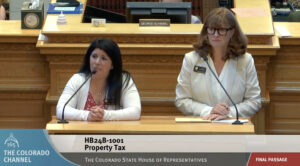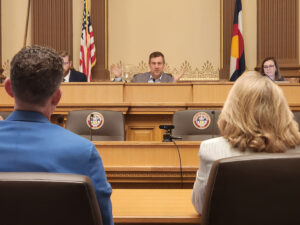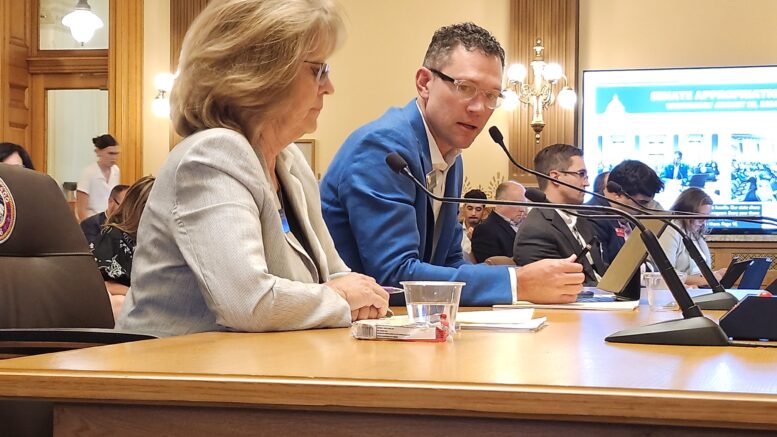Colorado senators Wednesday advanced a property-tax cut and nixed a separate measure that could have made it harder to pass future statewide tax breaks, despite the tax deal’s opponents calling it a “bipartisan charade” forced on the Legislature by “oligarchs.”
The third day of the special legislative session brought out some of the strongest opposition yet to a tax-cut bill brokered by Gov. Jared Polis to get proponents of two more sweeping tax-cut initiatives, Initiatives 50 and 108, to pull their measures from the November ballot. But House Bill 1001 passed the House by a solid 45-18 margin and then cleared the Senate Appropriations Committee without opposition before getting preliminary approval from the upper chamber.
Meanwhile, the Senate Finance Committee killed a proposed constitutional amendment that would have required future statewide property-tax changes to get approval from local governments before taking effect — a measure that could have derailed the brokered deal. While House Concurrent Resolution 1001 surprised some observers by passing the House on a largely partisan 44-19 vote, sponsoring Sen. Chris Hansen asked the committee to strike it down because he saw no path for it passing the more moderate Senate.
With those votes, the Legislature is on a path to adjourn Thursday after expected passage of just two of the 13 measures that were introduced in the special session — HB 1001 and a lower-profile bill to make permanent a tax break for greenhouse agricultural equipment. Polis is then expected to sign HB 1001 quickly at roughly the same time that Advance Colorado and Colorado Concern file paperwork to withdraw Initiatives 50 and 108 from the November ballot.
House leaders garner bipartisan support
House Speaker Julie McCluskie, the Dillon Democrat cosponsoring HB 1001 with GOP House Minority Leader Rose Pugliese of Colorado Springs, acknowledged after taking harsh criticism from her own caucus that the process for passing the bill was not ideal. Legislators OK’d a bipartisan $1.3 billion property-tax break, Senate Bill 233, in May, only to have initiative proponents say it wasn’t enough and demand another $248 million in breaks and a cap on statewide property-tax revenues for them to pull down 50 and 108.
But McCluskie said that rather than risk the passage of those two initiatives, which would have reduced local- and state-government revenues by some $2.4 billion through tax cuts and could have led to some major program cuts, she worked to find a compromise. And that is what she got through the House on Wednesday, despite “no” votes from 15 of the chamber’s 46 Democrats and three of its 19 Republicans.

Colorado state Reps. Rose Pugliese and Julie McCluskie seek support for their property-tax-cut bill from the House Wednesday.
“I believe that passing this bill and getting those initiatives off the ballot was the most responsible thing we could do,” McCluskie said. “What we are doing today is governance. Governance is hard … Choices are hard.”
Despite their handwringing over the comparatively much smaller tax breaks that HB 1001 offered, she and Pugliese got a big assist from Republicans, many of who backed the bill because it delivers more help to people whose property taxes have skyrocketed. Rep. Marc Catlin, R-Montrose, said that by passing HB 1001, he can go home to his constituents and say that he and other legislators saved taxpayers a cumulative $1.6 billion.
HB 1001 further reduces tax-assessment rates for residential properties from the lower levels established in SB 233 and sets caps on the annual statewide growth of property-tax revenues, with revenues going to school districts allowed to grow slightly more. Advance Colorado and Colorado Concern also agreed not to bring any further initiatives regarding property taxes for six years if legislators passed the bill with agreed-upon provisions.
A “fecal sandwich” served by “oligarchs”
McCluskie’s own party, which had tried unsuccessfully over the past two days to amend the bill to shift more of the property-tax relief to owners of lower-value homes, unloaded their frustration about the process before the final vote.
Rep. Brianna Titone, D-Arvada, complained that ballot proponents were using their initiatives to further their own interests in a way that was “nothing short of extortion” and called the deal “a fecal sandwich … that we’re forced to eat.” And Titone still ended up voting for HB 1001.
Rep. Elisabeth Epps, a Denver Democrat who lost her primary race in June after clashing with a number of House Democrats, said the deal cut in a backroom merely proved that voters should not trust the Legislature. She called it a “bipartisan charade, as bipartisan as apple pie and baseball and racism.”

Colorado state Rep. Stephanie Vigil criticizes a property-tax-cut bill on the House floor Wednesday.
But the biggest criticism came from Rep. Stephanie Vigil, who said the special session was called “because a decision was made to negotiate with oligarchs.” The Colorado Springs Democrat expounded that people were suffering monetarily not because of high taxes but because the people running large businesses refuse to pay adequate wages, hike the price of groceries and then expect the state to give money back to them.
“When it comes to the ever-increasing profits of big businesses, there’s no limit, no cap,” Vigil said. “That’s where all your money is going, Colorado. It’s going to oligarchs.”
Senators extol tax-cut benefits
Discussion of the bill in the Senate Appropriations Committee was decidedly different.
Sen. Barbara Kirkmeyer, the Brighton Republican who cosponsored HB 1001 with the Democratic Hansen, said that while she was pleased with the efforts in SB 233 — including reducing commercial tax-assessment rates from 29% to 25% — more could be done. She said she continued to hear from constituents about their pain after home valuations rose an average of 40% statewide in 2023 and jacked up their property-tax bills, so she continued negotiations with ballot proponents to see if there was a middle ground.
Mark Ferrandino, the director of the governor’s Office of State Budgeting and Planning, said the latest estimates show that home-value assessments are expected to rise by about 2.5% on average statewide, which will be reflected in 2025 bills. Not only is that total far smaller than the most recent reassessments, but the additional revenue the higher values will produce should make up for any revenue losses local governments take from the reduced assessment rates in HB 1001, he said.
Erin Meschke, a Boulder County activist, pushed back against the narrative that the special session was forced to do the bidding of moneyed interests who funded the initiative efforts.
“There’s been much talk about the wealthy who began the ballot measures, but normal citizens wanted both to be on the ballot and signed the petitions,” said Meschke, saying her biggest concern was that 200,000 signers now won’t get to vote on initiatives 50 and 108.
End of effort to localize property-tax-cut decisions

Colorado Senate Appropriations Committee Chairman Jeff Bridges questions sponsors of a property-tax-cut bill about the absence of two outside groups who helped to shape the bill.
Committee Democrats expressed far more concern about the fact that neither Advance Colorado President Michael Fields nor Colorado Concern President/CEO Dave Davia showed up during House or Senate hearings to testify on HB 1001. Chairman Jeff Bridges, D-Greenwood Village, held open testimony while asking if someone from the groups would call in, and he and Hansen grilled education leaders supporting the bill about why they felt initiative backers would follow through on their end of the deal.
Initiative proponents inferred in an interview with Colorado Politics last week that passage of HCR 1001 could cause them to break the deal. Opponents of the measure like Rep. Don Wilson, R-Monument, said that its nebulous requirement to make voters in cities, counties, special districts and school districts affirmatively recognize statewide property-tax cuts on a local level would delay implementation of breaks and confuse locals about why they needed to go to the ballot multiple times.
Supporters, including sponsoring Democratic Rep. Mike Weissman of Aurora, said the proposition was a simple one — that local governments, which levy and collect property taxes, should decide their levels rather than state officials who don’t benefit from them. Kevin Bommer, executive director of the Colorado Municipal League, said that many legislators who frequently invoke the merits of local control seemed oddly unwilling to let locals control the fate of their tax money this time.
“Balance … will be achieved”
But with proposed constitutional amendments requiring two-thirds support from each chamber for passage — a bar HCR 1001 cleared with the minimum possible number of votes in the House — and with Democrats making up less than two-thirds of the Senate (and including in their caucus several moderates), Hansen saw the writing on the wall. He, as well as supporters, said that he hopes the brief discussion this week was just the start of what will be more extensive legislative deliberations of the idea in the future.
And it appears that Polis may get his desired outcome from calling the special session — additional property-tax breaks without the massive impact that Initiative 50’s 4% revenue growth cap and Initiative 108’s further assessment-rate reductions would have caused. Sponsors have said the average break each homeowner will get because of HB 1001 is close to $80, in addition to the roughly $500 break they will get from SB 233.
“We think this balance between taxpayer relief and keeping government programs at the quality we need will be achieved,” said Henry Sobanet, chief financial officer for the Colorado State University system.
